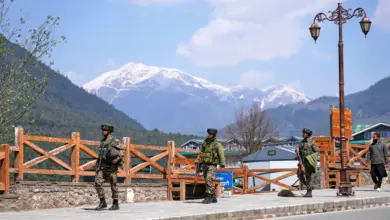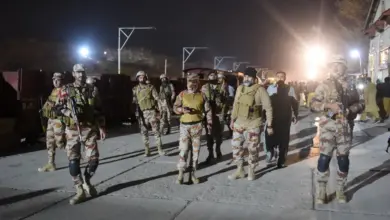It is a sordid tale: A 16-year-old girl is groped while walking along the street. She responds by spitting in her attacker’s face, vowing to take back her rights. He, in turn, guns her down with an automatic weapon.
That is what is alleged to have happened to Eman Mostafa two weeks ago in a small village in Upper Egypt’s Assiut Governorate. While details of the incident have only slowly trickled out, the monstrosity of the alleged crime suggests a frightening increase in gendered violence following a spate of well-publicized cases of harassment and assault in recent months.
The suspect, Ramadan Nasser Salem, is now in police custody after having fled for more than a week. In an interview on Al-Hayat TV channel Saturday, he denied the version of events offered by witnesses.
“I was riding my motorbike and I saw her,” he said. “I said hello, and she thought I was harassing her and started cursing at me and spat in my face. I mistakenly fired my gun, and a passer-by told me the bullet hit a wall. We thought the girl was afraid and fell on the ground, but then people told us that the bullet hit her. I never meant to kill her.”
Salem’s denial notwithstanding, Dalia Abd El-Hameed, a researcher at the Egyptian Initiative for Personal Rights, warns that the reported circumstances surrounding Mostafa’s death reflect a disturbing trend in sexual abuse against women.
“It’s becoming more violent, and this Assiut incident is a very vivid example of this,” she says. “He killed her. He killed her just because she defended herself. The mere fact was that she just didn’t accept what’s very accepted in society. When you don’t accept the norm, society punishes you. And he punished her.”
A 2010 survey by the Egyptian Center for Women’s Rights found that 83 percent of Egyptian women have experienced harassment. In response, advocacy groups have pressed the government to tackle the issue.
Their efforts have produced an occasional glimmer of hope. In 2008, the government — for the first time — sentenced a man to three years in prison on a sexual harassment charge. In late 2010, 23 NGOs and human rights organizations teamed up in what was hailed as an unprecedented initiative to amend the Penal Code to more effectively address sexual harassment and assault, although their momentum was upended by the revolution.
And yet, by most accounts, the situation has only gotten worse. Some feel that in the past, perpetrators would flee the scene of the crime out of shame or fear of public backlash, but today’s perpetrators feel no such compunction.
Instead, silence by both the government and the public has enabled a much more virulent strain of abuse to take root.
“What is most disturbing and alarming is that there is a paradigm shift, and sexual harassment now tends more to be assault,” Abd El-Hameed says. “It’s more intrusive, it’s more bold, and I think this is the result of immunity and impunity that the perpetrators have from both the society and the police.”
More than that, she adds, police themselves have frequently been among the worst offenders.
The political and social instability of the last year and a half has also been an important factor, says Hoda Badran, chairwoman of the Alliance for Arab Women, as “women are more vulnerable than others to violence.”
Indeed, several high-profile sexual assaults have taken place at political rallies, most notably in Tahrir Square. But Badran argues that the situation is slowly improving as stability has gradually returned since the presidential election.
Activists working on the issue also point to small but substantive gains. The high-profile attacks in Cairo over the last few months helped spawn several grassroots initiatives aimed at bringing public awareness to the problem.
Their efforts were on display Sunday in a rally in front of the presidential palace co-organized by the social advocacy organization Basma and Nefsi, a Cairo-based anti-harassment group, to decry Mostafa’s death and demand a law specifically targeting sexual harassment and assault.
About two dozen protesters lined the sidewalk along the main boulevard at rush hour, holding signs bearing messages such as “I don’t want to be afraid when I walk in the streets,” and “Morsy, Morsy, where are you?” in reference to President Mohamed Morsy. Basma has also organized patrols in metro stations to identify sexual harassers and report them to police.
There is no shortage of idealism on the activists’ part.
At the rally Sunday, many passing motorists signaled their approval by giving protesters the thumbs up. Others were less impressed; several stopped to argue that women brought the problem onto themselves with their immodest dress.
But even as the activists wage an uphill battle to effect a measure of progress in Cairo, Mostafa’s case underscores the daunting breadth of the problem. In spite of the incident’s obvious shock value, it has generated scant media coverage and, with the exceptions of a demonstration at Assiut University last week and this week’s protest in Cairo, almost no public reaction.
That has not surprised Abd El-Hameed.
“Since we are a very urban-centric country, what happens in Upper Egypt doesn’t necessarily grab the attention of Cairo residents and the government, and so on. This is the first thing,” she says. “The second part is the socioeconomic status of the victim, and I guess it’s typical for people from the lowest wealth quintile to not be taken care of or to not get enough attention.”
Or, as she put it more simply: “[Mostafa] was poor, she was young, she was a girl and he’s from Upper Egypt.”
Mostafa’s father, Mostafa Salama, appealed directly to the president in an interview with Al-Hayat.
“I call on President Morsy to look at Upper Egypt and take care of it,” he says. “This is the man who spoke of God and the Prophet Mohamed, and we voted for him. Now he should take care of us.”
Although efforts at top-down reform have so far failed, recent legislative initiatives in Pakistan and India to protect women from harassment in the workplace suggest possible paths forward for Egypt.
In 2010, Pakistan for the first time defined sexual harassment in the law and required employers to create inquiry committees to look into allegations of it.
Earlier this month, India’s lower house of parliament passed a similar bill that would require employers and local authorities to establish grievance committees to investigate complaints of sexual harassment. It is expected to become law in the coming months.
While women’s rights advocates in Egypt have tended to eye Morsy warily, some still harbor hopes that he can deliver similar reforms.
“I think that Morsy wants to do something about the problem because it affects all women — secular, Islamist — but he faces a lot of obstacles and opponents,” says Nihal Zaghloul, an organizer with Basma.
But laws alone are unlikely to do much. Critics have lambasted the Pakistani government over its failures to effectively implement its statute.
Last year, the Asian Human Rights Commission complained in an open letter to Pakistan’s president and others that high-ranking government officials, including from the prime minister’s office and the lower house of parliament, were working to protect a well-connected university professor who had been found guilty of sexual harassment by two separate inquiry committees.
Huma Yusuf, a Pakistani commentator, underlined the magnitude of the challenge in Dawn newspaper.
“To take the law’s spirit and implementation seriously, the Pakistani state and activist network must overcome the cultural prejudices not only of the Pakistani public, but also of the world at large. It’s a tall task, but one that should not be neglected,” Yusuf wrote.
Likewise, Egyptian activists readily acknowledge that the root of the problem is not deficient policy — sexual harassment and assault are already technically illegal — but prevailing social norms that subjugate women and stigmatize those who speak out. And while the revolution’s aftermath has created additional challenges for women, it has also freed up grassroots organizations to more effectively wage a battle for public opinion.
“What happened now is that by mobilizing society as a whole during the revolution, you have a mobilized mass — part of it is being mobilized against sexual harassment and assault,” says Abd El-Hameed. “We have girls who make protests against sexual harassment, we have posters, we have graffiti — so we have diversity in the actors and the tools that are being used. And this can lead to addressing the root of the problem.”




